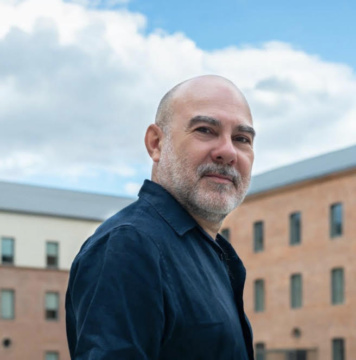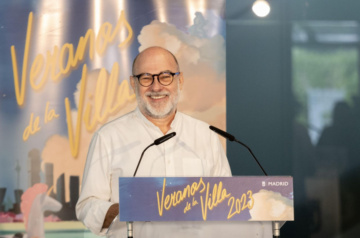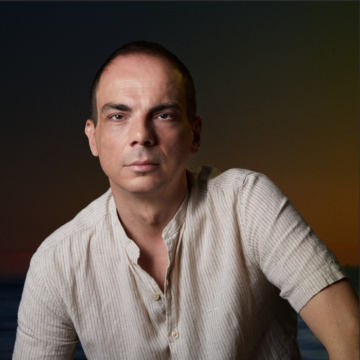Talks and Workshops 2023
Wednesday 4th October
-
Time: 7:30 pm. TALK: MADRID, from the point of view of its cultural policies

Speaker: Ángel Murcia
Running Time: 60 minutes
No interval, (talk in Spanish followed by Q&A with an interpreter in English)
Venue: Bush Theatre,Alen-Buckley Script Library, 7 Uxbridge Rd, W12 8LJ, London
Brief description:
Thoughts on a city that since the Transition to democracy has created its own brand as a vibrant, cultural and cosmopolitan city; reflecting its citizens, artists and visitors.
BIOGRAPHY
Angel Murcia was born in the Basque Country (Spain) in 1967.
He has been an executive producer and cultural events manager since 1989, both in the public and private sectors. Besides serving as executive producer for various production companies, he has worked as a production manager for the Barcelona and Valencia City Councils, La Abadía theatre in Madrid, the Madrid Regional Government (Comunidad Autónoma de Madrid), and the Spanish Ministry of Culture. Actually he is the Artistic Director of Veranos de la Villa, organized by the Madrid City Council from 2020.
He has always combined his work as a producer and cultural manager with teaching Production and Management in Performing Arts, where he has focused on the public sector. He has given classes in masters courses at the Ortega y Gasset University Institute, La Fábrica and Factoria Cultural, and he has led training courses for the Technology Centre for the Performing Arts (Spanish ministry of Culture, Education and Sports). He has also lectured in Spain and in South America for the Spanish Agency for International Development Cooperation (AECID), and for the National Institute of Performing Arts and Music (INAEM); he was invited by the China Central Academy of Drama (ACAD) to give a lecture on operation and management of theatre groups at the International Forum of Theatre Group Management.
https://www.veranosdelavilla.com/es
ES~
MADRID, visto desde su política cultural
Reflexión y presentación de una ciudad que desde la transición, ha creado su propio sello de ciudad vibrante, cultural y cosmopolita; reflejo de sus ciudadanos, artistas y visitantes.
BIOGRAFÍA
Ángel Murcia nació en el País Vasco (España) en 1967.
Es productor ejecutivo y gestor de eventos culturales desde 1989, tanto en el sector público como en el privado. Además de ser productor ejecutivo de varias productoras, ha trabajado como director de producción para los Ayuntamientos de Barcelona y Valencia, el Teatro de la Abadía de Madrid, Comunidad de Madrid y el Ministerio de Cultura de España. Actualmente, es el Director Artístico de Veranos de la Villa, desde el 2020, organizado por el Ayuntamiento de Madrid, ofreciendo programación cultural a la capital durante los meses de verano.
Siempre ha compaginado su labor como productor y gestor cultural con la docencia en Producción y Gestión de las Artes Escénicas, donde se ha centrado en el sector público. Ha impartido clases en cursos de máster en el Instituto Universitario Ortega y Gasset, La Fábrica y Factoría Cultural, y ha dirigido cursos de formación para el Centro Tecnológico de las Artes Escénicas (Ministerio de Cultura de España). También ha impartido conferencias en España y América del Sur para la Agencia Española de Cooperación Internacional para el Desarrollo (AECID), y para el Instituto Nacional de las Artes Escénicas y de la Música (INAEM); fue invitado por la Academia Central de Teatro de China (ACAD) para dar una conferencia sobre el funcionamiento y la gestión de grupos de teatro en el Foro Internacional de Gestión de Grupos de Teatro, y también clases y y asesoramiento sobre la gestión de teatros públicos para la Escuela de Dirigentes Teatrales de Moscú.
Thursday 5th October
-
Time: 10:00 am WORKSHOP: DESIGN AND MANAGEMENT OF CULTURAL SPACES, from the container to the contents.

Speaker: Ángel Murcia
Running Time: 3 hours. (workshop in Spanish with an interpreter in English)
Venue: Bush Theatre,Alen-Buckley Script Library, 7 Uxbridge Rd, W12 8LJ, London
Brief Description:
The management and production tools used during the different stages of the creative process that allow us to approach the processes relating to production and staging, while meeting artistic, social and brand objectives. Public cultural policies complement the artistic landscape, covering the objectives supported by our cultural heritage.
Practical examples from theatrical institutions and public festivals
Target audience: actors, dancers, directors, choreographers, set designers, costume designers, lighting technicians, technicians, producers, cultural centre managers and/or coordinators, artistic studies students, managers and directors of non-profit making institutions, spectators and the general public.
ES~
DISEÑO Y GESTIÓN DE ESPACIOS CULTURALES, del contenedor al contenido
Herramientas de gestión y producción utilizadas durante las distintas etapas del proceso de creación que permite un acercamiento al proceso de producción y exhibición, cumpliendo objetivos artísticos, sociales y de marca. La política cultural pública, complementa el panorama artístico, cubriendo los objetivos que vertebran nuestro patrimonio cultural.
Ejemplos prácticos de instituciones teatrales y festivales públicos
Destinatarios: actores, bailarines, directores, coreógrafos, escenógrafos, vestuaristas, iluminadores, técnicos, productores, gestores y/ o coordinadores de centros culturales, estudiantes de disciplinas artísticas, políticos, gestores de instituciones sin ánimo de lucro espectadores y público general.
-
Time: 4:30 pm WORKSHOP: Reinventing the Classics

Speaker: Paula Rodríguez
Running Time: 2 hours. (workshop in Spanish and English)
Venue: Bush Theatre,Alen-Buckley Script Library, 7 Uxbridge Rd, W12 8LJ, London
Brief Description:
This is a workshop for anyone who has an interest in telling stories. We will look into old stories with fresh eyes and create new tales inspired by Classics. Fragments from Spanish Golden Age authors such as Calderón de la Barca will assist us in the process. Participants are also welcome to bring their choice of classical/ancient text to work with. This is a safe space where everyone is welcome.
Target Audience: theatre lovers, artists and students.
ES~
Taller Reinventar los Clásicos – por Paula Rodríguez
Este taller va dirigido a todo aquel que tenga interés en contar historias. En él, exploramos textos antiguos desde una perspectiva contemporánea, para crear nuevas historias inspiradas en los clásicos. Fragmentos de autores del Siglo de Oro español como Calderón de la Barca nos ayudarán en el proceso. Los participantes también pueden traer su elección de texto clásico/antiguo con el que trabajar. Este es un espacio seguro donde todas y todos son bienvenidos.
Destinatarios: amantes del teatro, artistas y estudiantes
-
Time: 7:30 pm TALK : The Dark Stone: in memory of Federico García Lorca’s deepest love.

Speaker: Alberto Conejero (one of the greatest exponents of the new generation of Spanish playwrights, winner of the 2019 National Award for Dramatic Literature)
Running Time: 1 hour. (TALK in Spanish followed by Q&A (with an interpreter in English) plus Q&A in English & Spanish
Venue: Bush Theatre,Alen-Buckley Script Library, 7 Uxbridge Rd, W12 8LJ, London
Brief Description:
La piedra oscura (The Dark Stone) is the title of a lost work – or possibly a work that was never written – by Federico García Lorca. It is also the title of a play by Alberto Conejero López which, since its publication and stage production, has become one of the major events in contemporary Spanish theatre.
The play is based on genuine documents and sources to create a story about the last hours of Rafael Rodríguez Rapún, a member of Federico García Lorca’s Barraca theatre company, and the most profound love of his life. In this talk, Alberto Conejero will speak about this passionate individual, and also about the Sonetos del amor oscuro (Sonnets of Dark Love), Lorca’s lost works, and the reception given to a play that has already become a classic of modern Spanish theatre.
BIOGRAPHY
(Vilches, 1978)
Degree in Stage Direction and Dramatic Composition from the Real Escuela Superior de Arte Dramático and PhD from the Universidad Complutense de Madrid.
His work for the theatre includes the following outstanding plays: El mar: visión de unos niños que no lo han visto nunca (2022), La geometría del trigo, National Prize for Drama (2019); Los días de la nieve (2017, Premio Lorca 2019 for Best Author); Todas las noches de un día (2018, winner of AAT III Competition for
Theatre Scripts); La piedra oscura (2015, Premio Max for Best Playwright 2016 and Premio Ceres for Best Author 2016, and others); Ushuaia (2013-2022, Premio Ricardo López de Aranda 2013); Cliff (acantilado) [new title and version: ¿Cómo puedo no ser Montgomery Clift?], winner of IV LAM Competition 2010; Húngaros, National Prize for University Drama2000; Fiebre, runner-up National Prize for Theatre Shorts 1999.
He has also been responsible for several stage compositions and re-writing of scripts: including: Medea (Teatre Lliure), Electra (Ballet Nacional de España y Teatro de la Zarzuela, 2017), Fuenteovejuna (Compañía Nacional de Teatro Clásico, 2017); Troyanas (Festival de Teatro Clásico de Mérida, 2017), Rinconete y Cortadillo (Sexpeare Teatro, 2016), Amor de don Perlimplín con Belisa en su jardín (Festival de Otoño a Primavera / Metatarso, 2016), Proyecto Homero / Odisea (La Joven Compañía 2016).
In February 2020 he published En esta casa, his second collection of poems, following Si descubres un incendio (2017).
ES~
“La piedra oscura”: memoria del amor más hondo de Federico García Lorca.
“La piedra oscura” es el título de una obra perdida o quizá nunca escrita por Federico García Lorca. También es el título de un texto de Alberto Conejero López que desde su publicación y estreno se convirtió en unos de los grandes acontecimientos del teatro contemporáneo en España. La obra parte de fuentes y documentos reales para levantar una ficción en torno a las últimas horas de Rafael Rodríguez Rapún, compañero de la Barraca de Federico García Lorca, y el amor más hondo de su vida. En esta charla Alberto Conejero nos hablará de esta apasionante figura y también de los Sonetos del amor oscuro, la obra perdida de Lorca y la recepción de un texto convertido ya en un clásico del teatro español reciente.
BIOGRAFÍA
Alberto Conejero López
(Vilches, 1978)
Licenciado en Dirección de Escena y Dramaturgia por la Real Escuela Superior de Arte Dramático y doctor por la Universidad Complutense de Madrid.
De su producción dramática destacan: El mar: visión de unos niños que no lo han visto nunca (2022), La geometría del trigo, Premio Nacional de Literatura Dramática (2019); Los días de la nieve (2017, Premio Lorca 2019 Mejor Autor); Todas las noches de un día (2018, ganador del III Certamen de Textos Teatrales de la AAT); La piedra oscura (2015, Premio Max al Mejor Autor Teatral 2016 y Premio Ceres al Mejor Autor 2016, entre otros); Ushuaia (2013-2022, Premio Ricardo López de Aranda 2013); Cliff (acantilado) [nuevo título y versión: ¿Cómo puedo no ser Montgomery Clift?], ganador del IV Certamen LAM 2010; Húngaros, Premio Nacional de Teatro Universitario 2000; Fiebre, accésit Premio Nacional de Teatro Breve 1999.
Ha sido también responsable de diversas dramaturgias y reescrituras: Medea (Teatre Lliure), Electra (Ballet Nacional de España y Teatro de la Zarzuela, 2017), Fuenteovejuna (Compañía Nacional de Teatro Clásico, 2017); Troyanas (Festival de Teatro Clásico de Mérida, 2017), Rinconete y Cortadillo (Sexpeare Teatro, 2016), Amor de don Perlimplín con Belisa en su jardín (Festival de Otoño a Primavera / Metatarso, 2016), Proyecto Homero / Odisea (La Joven Compañía 2016), entre otras.
En febrero de 2020 publicó En esta casa, su segundo poemario tras Si descubres un incendio (2017).
Thursday 12th October
-
Time: 7:30 pm.TALK: Play Without a Title: the story of a process for impossible theatre
Speaker: Marta Pazos, one of the most important artists in the vanguard of Spanish stage production.
In Spanish followed by Q&A (with an interpreter in English)
Venue: Bush Theatre, Alen-Buckley Script Library, 7 Uxbridge Rd, W12 8LJ, London
Synopsis:
Play Without a Title, together with The Audience and When Five Years Pass, forms part of the so-called “trilogy of impossible theatre” in which Federico García Lorca approaches metatheatre using a language that is almost surrealist.
Read more...The first play is an unfinished work consisting of only the first Act, because the author was
assassinated before completing it, at the start of the Spanish Civil War in 1936.
In 2021, Marta Pazos was commissioned by the Centro Dramático Nacional to stage a new production of Play Without a Title in the Teatro María Guerrero in Madrid, the same theatre where the work was performed for the first time, in 1989, in an iconic production directed by Lluís Pascual with a set design by Fabiá Puiguserver.
In this lecture, Pazos will reveal the key elements of her production, starting with how the original concept arose, the interplay between the creative team, technicians and actors, and what it is like to work with an unfinished script without wanting to finish it, in the belief that absence can also be a presence, just as silence can also be music.
BIOGRAPHY:
Marta Pazos is one of the most important artists in the vanguard of Spanish stage production. Over the course of twenty-five years working as a theatre and opera director, set designer, playwright, costume designer, actor and visual artist, Pazos has developed a methodology based on the legitimization of intuition, deliberation of existential concerns, connection with the theatrical legacy and deconstructing hierarchies in the dialogue between materials and creative teams.
Her work is noteworthy for its plastic dimension and an aesthetic emancipation that go beyond realist theatre, blurring the borders between fiction and reality. Colour has a radical presence in her stage sets.
She has a fine arts degree from the University of Barcelona, with a specialism in painting and, after twenty years of self-taught development in stagecraft, she completed her education in Italy at the Scuola Cònia de la Societas, headed up by Claudia Castellucci.
Since 2000, she has directed theatre and opera for venues including the Gran Teatre del Liceu, Centro Dramático Nacional, Teatro Real, Teatro Español, Teatre Lliure, Teatro de La Abadía, Centro Dramático Galego and MA Scène Nationale.
She set up her own theatre companies, Belmondo (2000-2005) and Voadora (2007- 2022), with whom she signed off some of her most significant productions.
Some of her most outstanding productions include the world première of the opera Alexina B by Raquel García Tomás, based on the life of the intersex icon Herculine Barbin; the world première of the prize-winning opera Je suis narcissiste by Raquel García Tomás, a finalist in the International Opera Awards 2020 for Best World Première; versions of Shakespeare’s Othello related by the female characters, A Midsummer Night’s Dream with transgenderism as a core theme, and The Tempest; García Lorca’s Play Without a Title and Journey to the Moon; and Garage, a play about the role of women in the car industry, performed by female workers from PSA Peugeot-Citröen.
Her installations have been featured at the National Gallery Prague during the Prague Quadrennial PQ23, the CGAC Centro Galego de Arte Contemporánea and the Museo do Gaiás de la Cidade da Cultura.
She was awarded the Award of Honour for Merit in Dramatic Arts by the MIT Ribadavia, the ‘Dorotea Bárcenas’ Award of Honour in 2018 and four prizes from the Teatro María Casares as stage director and set designer.
She has given lectures, masterclasses and seminars at several American and European institutions. She lives in Santiago de Compostela, where she has her own studio.
ES~
“Comedia sin Título. Relato del proceso para un teatro imposible ”
Charla en español seguida de un encuentro con el público.
SINOPSIS:
“Comedia sin título” junto con “El Público” y “Así que pasen cinco años” forma parte de la llamada “trilogía del teatro imposible” en la que Federico García Lorca aborda la metateatralidad desde un lenguaje próximo al surrealismo. La primera es una obra incompleta de la que existe únicamente el primer acto pues el autor fue asesinado en la Guerra Civil española de 1936 antes de terminarla.
En 2021 por encargo del Centro Dramático Nacional Marta Pazos estrena una nueva puesta en escena de “Comedia sin Título” en el Teatro María Guerrero de Madrid, el mismo escenario dónde se estrenó el texto por primera vez en un icónico montaje con dirección de Lluís Pasqual y escenografía de Fabiá Puigserver en el año 1989.
En esta conferencia, Pazos revelará las claves de su puesta en escena, desde cómo surge la idea de llevarla a cabo, a la relación con el equipo creativo, los técnicos e intérpretes y el cómo es trabajar una obra incompleta sin querer completarla con la idea de que la ausencia también es presencia tal y como el silencio también es música.
BIOGRAFÍA:
Marta Pazos es una de las artistas más relevantes de la vanguardia escénica española.
Directora de escena de teatro y ópera, escenógrafa, dramaturga, figurinista, intérprete y artista visual, Pazos ha desarrollado a lo largo de veinticinco años de trayectoria escénica una metodología basada en la legitimación de la intuición, la ponderación de los cuidados de la vida, la conexión con el legado y la desjerarquización en el diálogo de los materiales y los equipos creativos.
Su obra destaca por una dimensión plástica y una emancipación estética más allá de un teatro realista difuminando las fronteras entre la ficción y lo real. En sus montajes el color aparece de manera radical.
Licenciada en Bellas Artes por la Universidad de Barcelona en la especialidad de pintura, tras veinte años de desarrollo autodidacta en la escena, completa su formación en Italia laureándose en la Scuola Cònia de la Societas dirigida por Claudia Castellucci.
Desde el año 2000 dirige teatro y ópera para entidades como el Gran Teatre del Liceu, Centro Dramático Nacional, Teatro Real, Teatro Español, Teatre Lliure, Teatro de La Abadía, Centro Dramático Galego o MA Scène Nationale.
Funda sus propias compañías Belmondo (2000-2005) y Voadora (2007-2022) con la que firma algunos de sus montajes más emblemáticos.
Entre sus puestas en escena destacan el estreno mundial de la ópera ‘Alexina B’, de Raquel García Tomás, sobre la biografía del icono intersex Herculine Barbin, el estreno mundial de la premiada ópera ‘Je suis narcissiste’, de Raquel García Tomás, finalista en los International Opera Awards 2020 como mejor estreno mundial; las versiones de las obras de Shakespeare ‘Othello’ contada desde los personajes femeninos, ‘Sueño de una noche de verano’ con el transgénero como tema vertebral o ‘La tempestad’; las versiones de las obras de Federico García Lorca ‘Comedia sin Título’ y ‘Viaje a la Luna’; o ‘Garage’, un trabajo sobre el papel de la mujer en la industria automovilística protagonizado por trabajadoras de PSA Peugeot-Citröen.
Sus instalaciones se han presentado en la National Gallery de Praga en la Prague Quadrennial PQ23, el CGAC Centro Galego de Arte Contemporánea y el Museo do Gaiás de la Cidade da Cultura.
Ha recibido el Premio de Honor al mérito en las artes escénicas de la MIT Ribadavia, el Premio de Honor ‘Dorotea Bárcenas’ 2018 y cuatro Premios de Teatro María Casares como directora de escena y escenógrafa.
Ha realizado conferencias, masterclass y seminarios en varios ámbitos americanos y europeos.
Vive y tiene su estudio en Santiago de Compostela.

